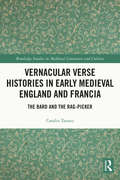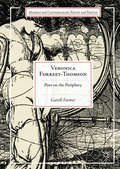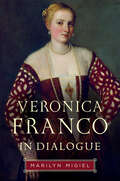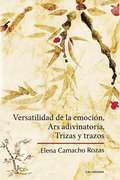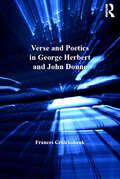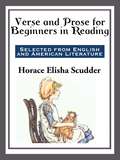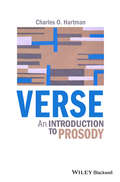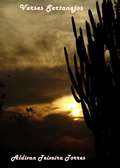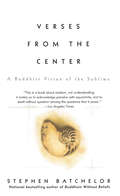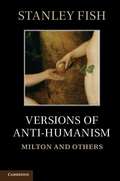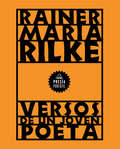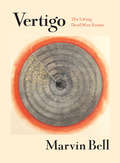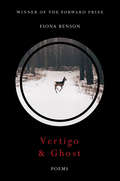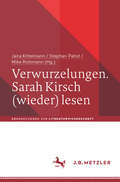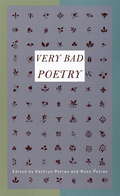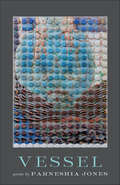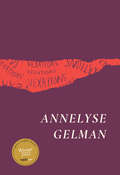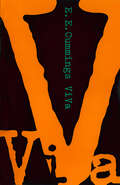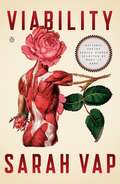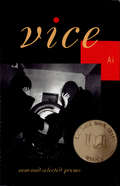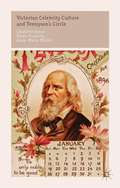- Table View
- List View
Vernacular Verse Histories in Early Medieval England and Francia: The Bard and the Rag-picker
by Catalin TaranuIn a provocative take on Germanic heroic poetry, Taranu reads texts like Beowulf, Maldon, and the Waltharius as participating in alternative modes of history-writing that functioned in a larger ecology of narrative forms, including Latinate Christian history and the biblical epic. These modes employed the conceit of their participating in a tradition of oral verse for a variety of purposes: from political propaganda to constructing origin myths for early medieval nationhood or heroic masculinity, and sometimes for challenging these paradigms. The more complex of these historical visions actively meditated on their own relationship to truthfulness and fictionality while also performing sophisticated (and often subversive) cultural and socio-emotional work for its audiences. By rethinking canonical categories of historiographical discourse from within medieval textual productions, Vernacular Verse Histories in Early Medieval England and Francia: The Bard and the Rag-Picker aims to recover a part of the wide array of narrative poetic forms through which medieval communities made sense of their past and structured their socio-emotional experience.
Veronica Forrest-Thomson
by Gareth FarmerThis study offers a comprehensive examination of the work of the young poet and scholar, Veronica Forrest-Thomson (1947-1975) in the context of a literary-critical revolution of the late sixties and seventies and evaluates her work against contemporary debates in poetry and poetics. Gareth Farmer explores Forrest-Thomson's relationship to the conflicting models of literary criticism in the twentieth century such as the close-reading models of F. R Leavis and William Empson, postructuralist models, and the work of Ludwig Wittgenstein. Written by the leading scholar on Forrest-Thomson's work, this study explores Forrest-Thomson's published work as well as unpublished materials from the Veronica Forrest-Thomson Archive. Drawing on close readings of Forrest-Thomson's writings, this study argues that her work enables us reevaluate literary-critical history and suggests new paradigms for the literary aesthetics and poetics of the future.
Veronica Franco in Dialogue (Toronto Italian Studies)
by Marilyn MigielSince the late twentieth century, the Venetian courtesan Veronica Franco has been viewed as a triumphant proto-feminist icon: a woman who celebrated her sexuality, an outspoken champion of women and their worth, and an important intellectual and cultural presence in sixteenth-century Venice. In Veronica Franco in Dialogue, Marilyn Migiel provides a nuanced account of Franco’s rhetorical strategies through a close analysis of her literary work. Focusing on the first fourteen poems in the Terze rime, a collection of Franco’s poems published in 1575, Migiel looks specifically at back-and-forth exchanges between Franco and an unknown male author. Migiel argues that in order to better understand what Franco is doing in the poetic collection, it is essential to understand how she constructs her identity as author, lover, and sex worker in relation to this unknown male author. Veronica Franco in Dialogue accounts for the moments of ambivalence, uncertainty, and indirectness in Franco’s poetry, as well as the polemicism and assertions of triumph. In doing so, it asks readers to consider their ideological investments in the stories we tell about early modern female authors and their cultural production.
Versatilidad de la emoción, Ars adivinatoria, Trizas y trazos
by Elena Camacho Rozas<P><P>Emociónate y adivínate en todos estos trazos. Escribir poesía puede ser una forma de llorar sin lágrimas las penas que nos atenazan, pero también de sonreír irónicamente haciéndole un corte de mangas a la muerte, a la vida y a nuestra propia solemnidad. <P><P>El sortilegio de esta comunicación ancestral y mágica compendia, como un oráculo, un manual de supervivencia: sirve de catarsis, explica los entresijos de la psicología humana, aleja del ostracismo y de la incomprensión. <P><P>La poesía no es una simple gragea capaz de aliviar al otro, adormecer su angustia, avivar sus compromisos, comprometer su docilidad, aclarar sus dudas o hacerle dudar de sus certezas; sino un mirador desde el que vernos reflejados, con la concisión de unos trazos caligráficos, en lo que cabalga en el ánimo o vive soterrado en el inconsciente de cualquiera de nosotros.
Verse and Poetics in George Herbert and John Donne
by Frances CruickshankInnovative and highly readable, this study traces George Herbert's and John Donne's development of a distinct poetics through close readings of their poems, references to their letters, sermons, and prose treatises, and to other contemporary poets and theorists. In demonstrating a relationship between poetics and religious consciousness in Donne's and Herbert's verse, Frances Cruickshank explores their attitudes to the cultural, theological, and aesthetic enterprise of writing and reading verse. Cruickshank shows that Donne and Herbert regarded poetry as a mode not determined by its social and political contexts, but as operating in and on them with its own distinct set of aesthetic and intellectual values, and that ultimately, verse mattered as a privileged mode of religious discourse. This book is an important contribution to the ongoing scholarly dialogue about the nature of literary and cultural study of early modern England, and about the relationship between the writer and the world. Cruickshank confirms Donne's reputation as a fascinating and brilliant poetic figure while simultaneously rousing interest in Herbert by noting his unique merging of rusticity and urbanity and tranquility and uncertainty, allowing the reader to enter into these poets' imaginative worlds and to understand the literary genre they embraced and then transformed.
Verse and Prose
by Horace Elisha ScudderA collection or rhymes, proverbs, and popular saysings for beginnings reader, edited by Horace Elisha Scudder.
Verse: An Introduction to Prosody (Princeton Legacy Library #2809)
by Charles O. HartmanVerse is a seminal introduction to prosody for any student learning to read or write poetry, from secondary to graduate school. Discusses iambic pentameter and other kinds of metrical verse, scansion, rhythm and rhyme, free verse, song, and advanced topics such as poetic meter, linguistic approaches to verse, and the computer scansion of metrical poetry Written in a clear, engaging style by a poet and teacher with more than 30 years of experience teaching the subject Supplemented by a user-friendly website with student exercises and additional resources
Verses Sertanejos
by Aldivan Teixeira Torres Luís CostaSertão of the northeast, arid and barren land, Cradle of the greatest droughts, In cycles she delights herself. When they come it causes great damage, For the earth, fauna, flora and the man himself. Everything she consumes. And what to do? Before tremendous tragedy? There are two possibilities: Stay and fight to survive Or get out. Although the second option is more plausible The sertanejo insists for the first one For the love of her land, her own origins. Your attitud is admirable and praiseworthy. I feel proud of this noble character Which is coarse, thick, strong And at the same time simple. Her example shows us where the true force is. A powerful force that is able to fight against the impossible This is something that politicians do not even think about. And so the sertão of the northeast lies/dies forgotten.
Verses from the Center
by Stephen BatchelorThe understanding of the nature of reality is the insight upon which the Buddha was able to achieve his own enlightenment. This vision of the sublime is the source of all that is enigmatic and paradoxical about Buddhism. In Verses from the Center, Stephen Batchelor explores the history of this concept and provides readers with translations of the most important poems ever written on the subject, the poems of 2nd century philosopher Nagarjuna.
Versions of Antihumanism: Milton and Others
by Stanley FishStanley Fish, one of the foremost critics of literature working today, has spent much of his career writing and thinking about Milton. This book brings together his finest published work with brand new material on Milton and on other authors and topics in early modern literature. In his analyses of Renaissance texts, he meditates on the interpretive problems that confront readers and offers a sustained critique of historicist methods of interpretation. Intention, he argues, is key to understanding which pieces of historical data are relevant to literary criticism. Lucid, provocative, direct and inimitable, this new book from Stanley Fish is required reading for anyone teaching or studying Milton and early modern literary studies.
Versos de un joven poeta
by Rainer Maria RilkeVersos de un joven poeta, de la colección «Poesía portátil», es una selección de los versos más representativos del gran poeta en lengua alemana del siglo XX, Rainer Maria Rilke, acompañada de su celebrada carta «Carta a un joven poeta». Abre esta selección la famosa «Carta a un joven poeta», una delicada misiva que Rainer Maria Rilke dirigió a un joven admirador en la que bien podría estar hablándole a todos aquellos movidos por un espíritu creador. Esta antología incluye algunos poemas tempranos, donde se entrevé el intelectual en el que se acabaría convirtiendo y también el amante que erró por toda Europa, enamorando sin promesas y huyendo, incapaz de vivir más allá de sí mismo. Cierra la antología una selección de El libro de horas, dedicado a la poesía, esa vocación total que le abdujo y le cobijó de una realidad en la que nunca llegó a encajar, siempre a la deriva entre lo divino y lo terrenal. Principal exponente de la poesía en lengua alemana del siglo XX, Rilke nació en Praga en 1875, donde estudió letras y filosofía, una carrera que continuaría en Múnich y en Berlín. Un viaje a Rusia en 1899 le inspiraría sus conocidas Elegías de Duino (1922). La leyenda de amor y muerte del alférez Christoph Rilke, incluida en esta antología, atrajo la atención de los críticos en Francia, donde había residido y trabado amistad con el escultor Auguste Rodin y el escritor André Gide. Tras la primera guerra mundial, en la que participó brevemente, viajó por varios países mediterráneos y finalmente se estableció en Suiza, donde publicaría los Sonetos a Orfeo, una de sus obras más conocidas. -------«Cuánto quiero a las pobres palabras, que tan míserasestán en lo diario: a ellas, las invisiblespalabras. De mis fiestas les regalo coloressonríen, y se ponen alegres lentamente.»-------
Versos de un joven poeta (Flash Poesía #Volumen)
by Rainer Maria RilkeVersos de un joven poeta, de la colección «Poesía portátil», es una selección de los versos más representativos del gran poeta en lengua alemana del siglo XX, Rainer Maria Rilke, acompañada de su celebrada carta «Carta a un joven poeta». Abre esta selección la famosa «Carta a un joven poeta», una delicada misiva que Rainer Maria Rilke dirigió a un joven admirador en la que bien podría estar hablándole a todos aquellos movidos por un espíritu creador. Esta antología incluye algunos poemas tempranos, donde se entrevé el intelectual en el que se acabaría convirtiendo y también el amante que erró por toda Europa, enamorando sin promesas y huyendo, incapaz de vivir más allá de sí mismo. Cierra la antología una selección de El libro de horas, dedicado a la poesía, esa vocación total que le abdujo y le cobijó de una realidad en la que nunca llegó a encajar, siempre a la deriva entre lo divino y lo terrenal. Principal exponente de la poesía en lengua alemana del siglo XX, Rilke nació en Praga en 1875, donde estudió letras y filosofía, una carrera que continuaría en Múnich y en Berlín. Un viaje a Rusia en 1899 le inspiraría sus conocidas Elegías de Duino (1922). La leyenda de amor y muerte del alférez Christoph Rilke, incluida en esta antología, atrajo la atención de los críticos en Francia, donde había residido y trabado amistad con el escultor Auguste Rodin y el escritor André Gide. Tras la primera guerra mundial,en la que participó brevemente, viajó por varios países mediterráneos y finalmente se estableció en Suiza, donde publicaría los Sonetos a Orfeo, una de sus obras más conocidas. -------«Cuánto quiero a las pobres palabras, que tan míserasestán en lo diario:a ellas, las invisiblespalabras. De mis fiestas les regalo coloressonríen, y se ponen alegres lentamente.»-------
Vertigo
by Marvin Bell"Marvin Bell has the largest heart since Walt Whitman."-Harvard Review"One of our finest and most acclaimed poets."-Booklist"Charged with making the darkness visible, Bell's 'Dead Man' sometimes glows with an eerily illuminating light."-Publishers WeeklyMarvin Bell is one of America's great poets, and his legacy includes the invention of a startling poetic form called the "Dead Man" poems. The Dead Man is alive and dead at once: not a persona, but an overarching consciousness, embedded in poetics and philosophy. Vertigo is the latest from the Dead Man-a brilliant, enigmatic, wise, and wild book.The dead man stands still, waiting for the boomerang to-you know.He hears the words of philosophers ricochet among chasms and disappear in the far away.His scent goes forth, his old skin, hair and nails, and he spits, too.He leans forward to look backward, and the ancient world reappears.It is the beginning, when mountains, canyons and seas were new,before the moon had eyes, before paper, before belief.Anything he says now are souvenirs of the future...Marvin Bell has published seventeen books of poetry and has received numerous honors, including the Lamont Award and Senior Fulbright appointments to Yugoslavia and Australia. He taught for forty years at the Iowa Writers' Workshop, and was the first State Poet of Iowa. He lives in Iowa and Washington.
Vertigo & Ghost: Poems
by Fiona BensonNamed a Most Anticipated Book of Spring 2021 by Publishers Weekly Winner of the 2019 Forward and Roehampton Prizes, Vertigo & Ghost offers a searing reimagining of Greek myths of sexual violence that crackles with rage, energy, and empathy. Beginning with a poem about the teenage dawning of sexuality, Vertigo & Ghost pitches quickly into a fierce, electrifying, riveting sequence that exposes Zeus as a serial rapist, for whom women are prey and sex is weaponized. As unflinching, devastating poems of vulnerability and anger confront Zeus with aggressions both personal and historical, his house comes crumbling down. In its place, acclaimed poet Fiona Benson reveals a disturbing contemporary world in which violent acts against women continue to be perpetrated on a daily, even hourly, basis. In the volume’s second half, Benson shifts to an intimate and lyrical document of depression and family life. These moving poems probe the ambivalent terrain of early motherhood—its anxieties and claustrophobias as well as its gifts of tenderness and love—reclaiming the sanctuary of domestic private life and the right to raise children in peace and safety. Together, these two halves form a complex portrait of modern womanhood. Dynamic in its range and risk, Vertigo & Ghost introduces an important British voice to an American audience, a voice that speaks out with clarity, grace, and bravery against abuse of power.
Verwurzelungen. Sarah Kirsch (Abhandlungen zur Literaturwissenschaft)
by Jana Kittelmann Stephan Pabst Mike RottmannSarah Kirsch (1935-2013) zählt zu den bedeutendsten deutschsprachigen Dichterinnen. Erfolgreiche Lyrikbände wie „Zaubersprüche“ und „Erlkönigs Tochter", die Interviewsammlung „Die Pantherfrau“ oder die Erzählung „Allerlei-Rauh“ haben die gesamtdeutsche Literaturlandschaft nachhaltig beeinflusst. Kirsch hinterließ ein vielfältiges Werk, das neben Gedichten auch Briefwechsel, Tagebuchaufzeichnungen, Reiseberichte, Feuilletonbeiträge, kleinere Prosatexte, Übersetzungen, Zeichnungen und Aquarelle umfasst. Der Sammelband arbeitet mehr als zehn Jahre nach dem Tod der Dichterin die fortwährende Brisanz und Aktualität ihres Werks heraus, das von dem unverwechselbaren „Sarah-Sound" (Peter Hacks) ebenso geprägt ist wie von einer präzisen und zugleich visionären Wahrnehmung von Natur und deren Gefährdung.
Very Bad Poetry
by Ross Petras Kathryn PetrasWriting very bad poetry requires talent. It helps to have a wooden ear for words, a penchant for sinking into a mire of sentimentality, and an enviable confidence that allows one to write despite absolutely appalling incompetence. The 131 poems collected in this first-of-its-kind anthology are so glaringly awful that they embody a kind of genius. From Fred Emerson Brooks' "The Stuttering Lover" to Matthew Green's "The Spleen" to Georgia Bailey Parrington's misguided "An Elegy to a Dissected Puppy", they mangle meter, run rampant over rhyme, and bludgeon us into insensibility with their grandiosity, anticlimax, and malapropism. Guaranteed to move even the most stoic reader to tears (of laughter),Very Bad Poetryis sure to become a favorite of the poetically inclined (and disinclined).
Vessel: Poems
by Parneshia JonesWINNER OF THE MIDWEST BOOK AWARDThe imagination of a girl, the retelling of family stories, and the unfolding of a rich and often painful history: Parneshia Jones&’s debut collection explores the intersections of these elements of experience with refreshing candor and metaphorical purpose.A child of the South speaking in the rhythms of Chicago, Jones knits &“a human quilt&” with herself at the center. She relates everything from the awkward trip to Marshall Fields with her mother to buy her first bra to the late whiskey-infused nights of her father&’s world. In the South, &“lard sizzles a sermon from the stove&”; in Chicago, we feast on an &“opera of peppers and pimento.&” Jones intertwines the stories of her own family with those of historical black figures, including Marvin Gaye and Josephine Baker. Affectionate, dynamic, and uncommonly observant, these poems mine the richness of history to create a map of identity and influence.
Veterans of War, Veterans of Peace
by Maxine Hong KingstonNational Book Award Winner Maxine Hong Kingston, author of The Woman Warrior, China Men, and The Fifth Book of Peace, has been leading writing-and-meditation workshops for veterans for more than a decade. The practice of meditating together, writing stories and poems, and then reading their works aloud has been extremely healing for these individuals and has produced some extraordinary writing - Tolstoy-like descriptions of battle scenes, Hemingway-esque flashbacks, and gripping accounts of growing up in military families, serving as medics in the thick of war, coming home to homelessness, and finally doing the work to experience first-hand the deep transformation that is possible when one truly comes to grips with one's whole past.
Vexations (Phoenix Poets)
by Annelyse GelmanA mother and daughter journey together through a strange speculative world in this experimental book-length poem. Annelyse Gelman’s book-length poem Vexations is a surreal, glitchy meditation on empathy, ecology, and precarity. Throughout the book winds a narrative about a mother and daughter as they move through a world of social and economic collapse in search of a post-capitalist safe haven. All the while, they also navigate a condition that affects the daughter’s empathic abilities, making her vulnerable to emotional contagion. Vexations is titled and structured after Erik Satie’s composition of the same name, a piece that requires patience, endurance, and concentration from both its audience and its players. Similarly, Gelman’s Vexations employs repetition and variation to engage the reader’s attention. Hers is an ambient poetry, drawing on the aesthetic qualities of drone music and sampling voices and sounds to create a lush literary backdrop filled with pulsing psychedelic detail.
Vexations (Phoenix Poets)
by Annelyse GelmanA mother and daughter journey together through a strange speculative world in this experimental book-length poem. Annelyse Gelman’s book-length poem Vexations is a surreal, glitchy meditation on empathy, ecology, and precarity. Throughout the book winds a narrative about a mother and daughter as they move through a world of social and economic collapse in search of a post-capitalist safe haven. All the while, they also navigate a condition that affects the daughter’s empathic abilities, making her vulnerable to emotional contagion. Vexations is titled and structured after Erik Satie’s composition of the same name, a piece that requires patience, endurance, and concentration from both its audience and its players. Similarly, Gelman’s Vexations employs repetition and variation to engage the reader’s attention. Hers is an ambient poetry, drawing on the aesthetic qualities of drone music and sampling voices and sounds to create a lush literary backdrop filled with pulsing psychedelic detail.
ViVa
by E. E. CummingsFresh and candid, but turns earthy, defiant, and romantic, E. E. Cummings' poems celebrate the uniqueness of each individual, the need to protest the dehumanizing force of organizations, and the exuberant power of love. First published in 1931, ViVa contains four of E. E. Cummings' most experimental poems as well as some of his most memorable. The volume includes such no-famous celebrations as "i sing of Olaf glad and big" and "if there are any heavens my mother will (all be herself) have," along with such favorites as "Space being (don't forget to remember) Curved," "a clown's smirk in the skull of a baboon," and "somewhere I have never traveled, gladly beyond."
Viability
by Sarah VapSelected as a Winner of the National Poetry Series by Mary Jo BangSarah Vap's sixth work of poetry, Viability is an ambitious and highly imaginative collection of prose poems that braids together several kinds of language strands in an effort to understand and to ask questions about the bodies (and minds, maybe even souls) that are owned by capitalism. These threads of language include definitions from an online financial dictionary, samples from an essay on the economics of slavery, quotations from an article about slavery in today's Thai fishing industry, lyric bits and pieces about pregnancy and infants of all kinds, and a wealth of quotations falsely attributed to John of the Cross. The viability that Vap is asking about is primarily economic and biological (but not only). The questions of viability become entwined with the need, across the book, to "increase"--in both a capitalist and a gestational sense. John of the Cross tries, at first with composure, to comment on or to mediate between all the different strands of the collection.
Vice: New and Selected Poems
by AiCollected here are poems from Ai's previous five books--Cruelty, Killing Floor, Sin, Fate, and Greed--along with seventeen new poems. Employing her trademark ferocity, these new dramatic monologues continue to mine this award-winning poet's "often brilliant" (Chicago Tribune) vision.<P><P> Winner of the National Book Award
Victorian Celebrity Culture and Tennyson’s Circle
by Charlotte Boyce Páraic Finnerty Anne-Marie MillimTennyson experienced at first hand the all-pervasive nature of celebrity culture. It caused him to retreat from the eyes of the world. This book delineates Tennyson's reluctant celebrity and its effects on his writings, on his coterie of famous and notable friends and on the ever-expanding, media-led circle of Tennyson's admirers.
